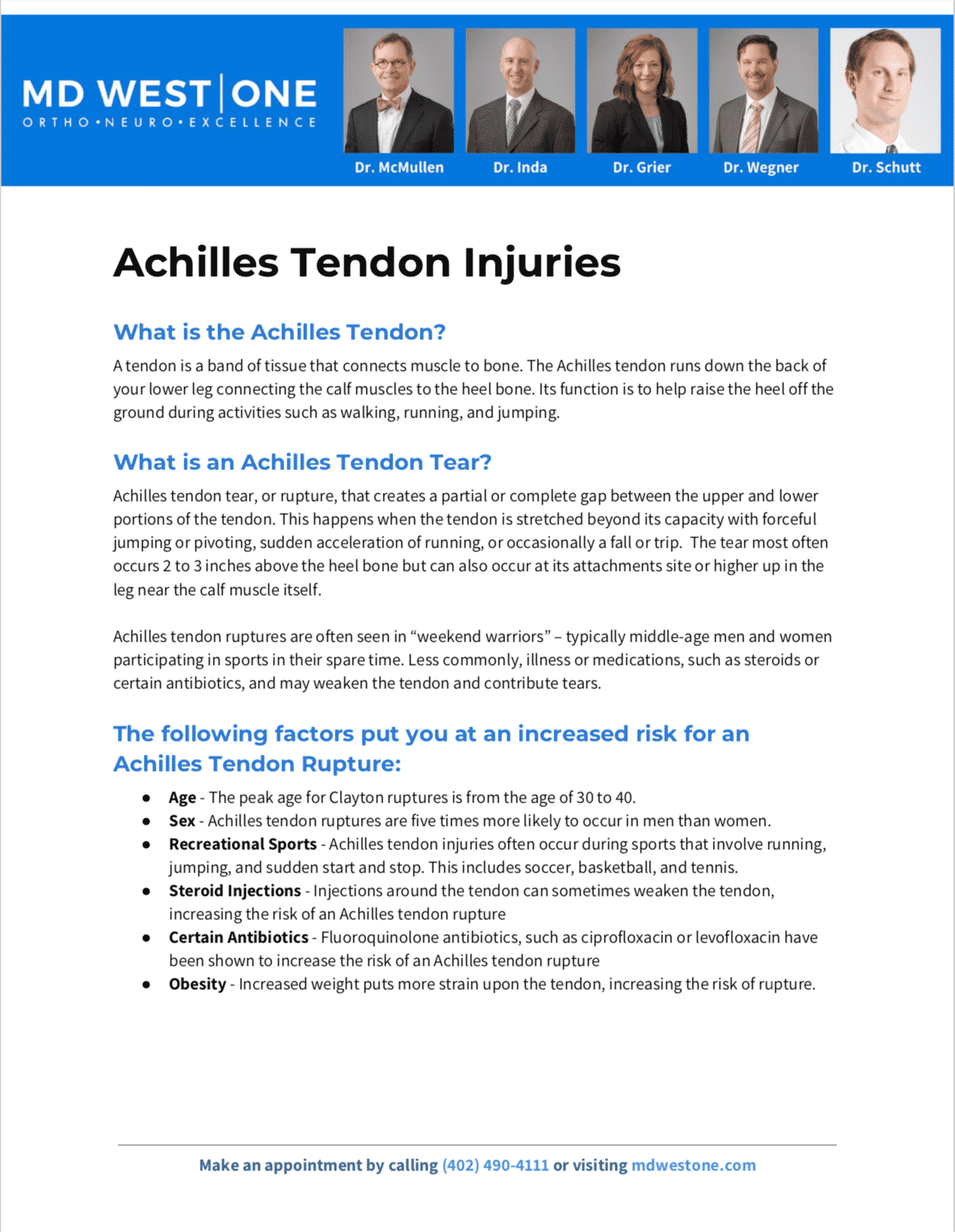Are you suffering from potential Gout?
The Omaha Foot & Ankle Specialists at MD West ONE are able to properly diagnose and treat Gout through both surgical and non-surgical treatments. If you have the following symptoms, you may want to make an appointment with one of our Board Certified Specialists.
- Intense pain
- Redness
- Stiffness
- Swelling
- Tenderness, even to light touch, such as from a bedsheet
- Warmth, or a feeling like the joint is “on fire”
Meet MD West ONE's foot and ankle specialists and learn more about how they treat gout.
Gout Causes, Treatments & Surgery
What is Gout?
Gout causes pain and swelling in one or more joints. It typically affects the big toe. But it is also found in other joints, including the knee, ankle, foot, hand, wrist, and elbow.
The following factors put you at an increased risk for Gout:
Gout can affect anyone. It usually occurs earlier in men than women. It generally occurs after menopause in women. Men can be three times more likely than women to get it because they have higher levels of uric acid most of their lives. Women reach these uric acid levels after menopause.
People are more likely to get gout if they have:
-
Obesity, or a lot of extra weight.
-
Congestive heart failure.
-
Diabetes.
-
Family history of gout.
-
Hypertension (high blood pressure).
-
Kidney disease.
-
Consume a diet high in animal proteins
-
Consume a significant amount of alcohol
-
Are on water pills (diuretics).
Ways to Decrease Your Risk of Developing Gout:
- Drink plenty of water to help your kidneys function better and avoid dehydration.
- Exercise regularly to stay at a healthy weight. Extra weight increases uric acid in your body and puts more stress on joints.
Do your best to limit the purines in your body, since these chemicals can trigger uric acid buildup. Foods and drinks containing high purine levels include:
- Alcohol.
- Red meat and organ meats (liver, for example).
- Shellfish.
- Gravy.
- Drinks and foods high in fructose (fruit sugar).
- Protein from animal sources. All protein from animal flesh can potentially lead to elevated uric acid levels.
Certain medications can lead to elevated uric acid levels. These medications include:
- Diuretics, also known as “water pills.”
- Immunosuppressants, or drugs used to slow the immune system (common in organ transplants, for example).
DIAGNOSIS
If you have sudden or severe pain in a joint, you should talk to your primary care provider (PCP). Your PCP may send you to a rheumatologist, a doctor who specializes in gout and other kinds of arthritis.
Healthcare providers consider several things when confirming gout:
- Symptoms: The provider will ask you to describe your symptoms, how often they happen and how long they last.
- Physical examination: Your provider will examine the affected joint(s) to look for swelling, redness, and warmth.
- Blood work: A test can measure the amount of uric acid in your blood.
- Imaging tests: You may have pictures taken of the affected joint(s) with X-rays, an ultrasound or MRI.
- Aspiration: The provider may use a needle to pull fluid from the joint. Using a microscope, a team member can look for uric acid crystals (confirming gout) or a different problem (such as bacteria with infection or other type of crystal).
TREATMENT OPTIONS
Some drugs help control symptoms:
- NSAIDs can reduce pain and swelling. Some people with kidney disease, stomach ulcers, and other health problems are unable to take NSAIDs.
- Colchicine can reduce inflammation and pain if you take it within 24 hours of a gout attack. It is given by mouth.
- Corticosteroids can relieve pain and swelling. You take steroids by mouth or with an injection.
Drugs that help lower levels of uric acid in your body to prevent or reduce future episodes of gout attacks:
- Allopurinol, taken as a pill.
- Febuxostat, taken as a pill.
- Pegloticase, given as an intravenous (in the vein) infusion.
- Probenecid, taken as a pill.
Frequently Asked Questions?
What causes gout?
The human body makes uric acid during the breakdown of chemicals called purines found in certain food and drinks. This normal byproduct goes through the kidneys and exits the body when you pee.
Sometimes the body produces too much uric acid. Or the kidneys cannot do a good job handling it. When the body has high levels of uric acid, or hyperuricemia, uric acid crystals can concentrate in the joints. The sharp, needle-like crystals cause gout. However, many people with higher uric acid levels never get gout.
Some people have gout attacks frequently, while others go years between episodes. If gout is not treated, attacks may become more frequent and last longer. Gout attacks can happen over and over again in the same joint or affect different joints.
How can I manage a gout attack?
When you have a gout attack, you can manage your symptoms by:
- Avoiding alcohol and sweet drinks.
- Drinking plenty of fluids.
- Elevating the joint(s).
- Putting ice on the joint(s).
- Limiting any stress on the joint(s).
AMERICAN ORTHOPAEDIC FOOT & ANKLE SOCIETY
All of the foot and ankle surgeons in the practice are recognized members of the American Orthopaedic Foot & Ankle Society. It is the oldest and most prestigious medical society dedicated to the foot and ankle. The mission of the society is to advance science and practice of foot and ankle surgery through education, research, and advocacy on behalf of patients and practitioners. These physicians dedicate their time and energy to improving the patient experience and their knowledge in their field. For more information visit http://www.aofas.org.
MD West ONE Foot & Ankle Specialists:
The Foot & Ankle Specialists are all Board Certified and Fellowship-Trained, meaning they’ve focused their education, training and research on orthopaedic surgery of the foot and ankle.






